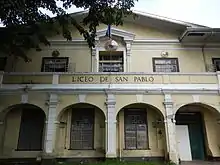Liceo de San Pablo
Liceo de San Pablo, formerly Ateneo de San Pablo, is a private sectarian, diocesan Catholic school in San Pablo City, Laguna.

History
In 1912, the Seminario Menor de San Francisco de Sales, consisting of a two-storey building was constructed adjacent to the cathedral. After some years, however, it was closed and transferred to Lipa. Before the outbreak of the Second World War, the Seminary building and its premises were donated to the Society of Jesus (the Jesuits) for conversion into a basic educational institution. This was during the term of Bishop Afredo Versoza of the Diocese of Lipa, which included the province of Laguna, and the city of San Pablo. In 1947, the Jesuit Fathers converted the former Seminary, which was partially damaged by the Japanese forces, into a secondary school. It was named Ateneo de San Pablo.
In 1967, the Diocese of San Pablo was created, separate from the Lipa Diocese. The diocesan officials thought it logical that the site for the seminary and diocesan curia be in San Pablo. After the creation of the diocese, the newly appointed bishop, Most Rev. Pedro N. Bantigue, D.D. asked the Society of Jesus to redonate the Ateneo building site to the diocese. The Jesuits agreed to execute a deed of redonation and the signing of the deed was scheduled on March 11, 1969. The Ateneans and many sympathizers staged rallies and demonstrations to prevent the signing of the contract and they succeeded.
The following year, the Ateneo de San Pablo was again threatened by the same case of 1969. On February 26, 1977, the Rome Supreme Tribunal ordered the Jesuits to comply with the redonation agreement made previously with Bishop Bantigue. The signing of the contract was rescheduled for June 15, 1977. In April of the same year, the Jesuits received a letter from Rome explaining the order for the Jesuits to leave the Ateneo site and informing them that the Bishop will pay P850,000.00 as compensation for the improvements made by them on the site.
The Ateneo community tried to prevent the signing of the deed but to no avail this time. The deed was signed and the ownership of the land and the buildings of the Ateneo was transferred to the Diocese. The twenty-eighth and last graduation day in the Ateneo de San Pablo was held on March 31, 1978, marking the end of a beloved institution. The Ateneo de San Pablo became the Liceo de San Pablo, a parochial school of the Diocese.
The Liceo de San Pablo began its operation during the school year 1978–1979. From then on, it maintained its identity as exclusive catholic learning institution for young boys. Under its present bishop, Monsignor Francisco Capiral San Diego, D.D., the school has undergone significant changes: administrative, faculty-composition, curricula and physical/facilities expansion.
In response to the call and challenges of the time, construction and renovation started in school year 1996–1997. The first phase of renovation gave emphasis to the ceiling, electrical wiring and paintings. The second phase of renovation focused on the re-construction of the offices of the principal, cashier, academic affairs, guidance and the DCSS Auditor. The faculty room and the drainage systems were repaired, too. The Grade School building was also constructed behind the school's gymnasium, which marked the separation of the High School and Grade School buildings.
Starting school year 1998–1999, after celebrating its 20th foundation anniversary, the school welcomed into its fold 132 female students (100 in first year and 30 in second year). In this significant step, the school fulfilled its major task of offering equal academic and religious opportunities and advancement to the youth regardless of gender. The Liceo de San Pablo is now a school for boys and girls. Its grade school and high school departments are both coeductional.[1]
External links
| Wikimedia Commons has media related to Liceo de San Pablo. |